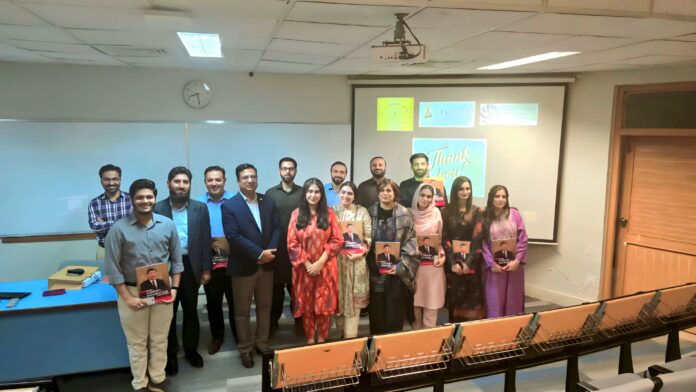
CT Newsroom
Executive Director, Pakistan Research Center for a Community with Shared Future (PRCCSF) Khalid Taimur Akram, gave a special academic lecture on “Corporate Law in the Age of CPEC: Legal Frameworks Driving Business Expansion and Investment”.
As per details, Executive Director, Pakistan Research Center for a Community with Shared Future (PRCCSF) Khalid Taimur Akram, gave a special academic lecture on “Corporate Law in the Age of CPEC: Legal Frameworks Driving Business Expansion and Investment” to executive MBA students at National University of Sciences and Technology (NUST) Business School (NBS), at Islamabad on 11th April 2025,
Duirng the lecture, Khalid Akram emphasized the transformative potential of CPEC’s second phase, describing it as a “goldmine for entrepreneurs.”
He said that Phase I focused on laying critical infrastructure foundations.
He explained that Phase II prioritizes “services, innovation, and business facilitation,” creating fertile ground for startups and SMEs to thrive.
He argued that this shift aligns with global economic trends where agility and creativity drive growth. Urging the audience to embrace entrepreneurship over traditional employment,
Khalid Akram stated, “True growth lies in creating opportunities, not waiting for them.”
He stressed the importance of practical business skills, risk-taking, and self-reliance, presenting CPEC as an ecosystem where ambitious individuals can “build their own empires” through scalable ventures.
Mr. Akram also focused on the Belt and Road Initiative, highlighting how it serves as a framework for fostering international cooperation and mutual benefits among participating nations.
He emphasized the Community with a Shared Future concept, which advocates for collaborative development and shared prosperity, aligning with the broader goals of CPEC.
Furthermore, he outlined President Xi Jinping’s policies aimed at promoting innovation, sustainability, and investment, urging the students to leverage these frameworks to unlock their entrepreneurial potential within this transformative ecosystem.
Khalid Akram talk also focused on the role of Alternative Dispute Resolution (ADR) mechanisms, including arbitration and mediation, in ensuring smooth cross-border operations under CPEC.
He highlighted ADR as a vital tool to minimize legal bottlenecks.
He advised businesses to incorporate ADR clauses in contracts to avoid protracted litigation, noting that “These mechanisms are not just legal safeguards, but essential drivers of investor confidence and operational efficiency in a globalized economy.”
It is worth mentioning that Khalid Akram outlined actionable opportunities within CPEC’s Phase II framework, identifying sectors such as logistics, fintech, renewable energy, and tourism as high-potential areas for innovation.
He encouraged entrepreneurs to leverage Pakistan’s strategic location and CPEC’s connectivity to develop solutions in supply chain modernization, digital payments, green technologies, and cultural tourism. “The corridor is more than a physical network,” he remarked, “it’s a platform for redefining regional economic collaboration.”




